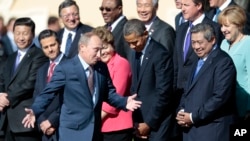U.S. President Barack Obama has arrived in Russia for a meeting of world leaders that is expected to be overshadowed by debate over possible U.S. military strikes in Syria.
The Syrian crisis is not on the official agenda for the two-day Group of 20 global economic summit in Saint Petersburg, but leaders are expected to discuss it on the sidelines.
Obama is seeking broader support, both at home and abroad, for military strikes against Syria's government for allegedly using chemical weapons on its civilians.
A day before the G20 summit, a key U.S. Senate panel approved a plan that would call for limited strikes but rules out the use of ground troops. The measure will go to the full Senate next week, and must pass there, as well as in the House of Representatives, where it could meet stiff resistance from Republican Party lawmakers.
Wednesday's 10-7 Senate Foreign Relations committee vote came as Obama's top foreign policy and defense advisers testified for a second day in Congress, trying to persuade doubtful lawmakers to approve the president's plan for a strike against Syria's military capabilities.
Secretary of State John Kerry spent much of the afternoon speaking to a House of Representatives committee.
"As we debate, the world is watching and the world is wondering, not whether Assad's regime actually did this," Kerry said. "The world is wondering whether the United States of America is going to consent through silence to stand aside while this kind of brutality is allowed to happen without consequence."
Obama argues for military action
In Sweden Wednesday, President Obama said a failure to respond to the use of chemical weapons in Damascus would only increase the chance they would be used again.
President Obama said the world had long ago determined that using chemical weapons could not be tolerated. Thus, he said, his own credibility is not at stake if there is no action against Syrian President Bashar al-Assad.
“The international community's credibility is on the line,'' he said. “And America and Congress' credibility is on the line, because we give lip service to the notion that these international norms are important.”
The president acknowledged that many Europeans are hesitant to act militarily against Syria because of the incorrect allegations of chemical weapons that led to the war in Iraq.
“I’m not interested in repeating mistakes of us basing decisions on faulty intelligence, but having done a thorough evaluation of the information that is currently available, I can say with high confidence chemical weapons were used,” he said.
Obama has said he is convinced that President Assad's government used chemical weapons on civilians in the attack on August 21, which killed more than 1,400 people near Damascus.
Syria denies using chemical weapons, alleging it was the rebels who deployed them.
Russia, China issue warnings
Russia, Syria's main supplier of arms, and China have already vetoed three U.N. Security Council resolutions on Syria.
Speaking ahead of the summit, Chinese Vice Foreign Minister Zhu Guangyao said Thursday any military action against Syria would cause a hike in oil prices and have a "negative impact" on the global economy.
On Wednesday, Russian President Vladimir Putin warned Western strikes without U.N. Security Council approval would be an unacceptable "aggression." But he said he would support a strike if there were "convincing" proof that Damascus used chemical weapons.
"Only the U.N. Security Council could sanction the use of force against a sovereign state," Putin told the Associated Press and Russia's state Channel 1 television network. "Any other pretext or method which might be used to justify the use of force against an independent sovereign state is inadmissible and can only be interpreted as an aggression."
Putin urged the U.S. to present "convincing" evidence about chemical weapons to the United Nations.
He said Russia has suspended the delivery of S-300 surface-to-air missile components to Syria, but would reconsider if steps are taken that "violate international norms."
UN hopes for political solution
Even as the U.S. pushes for possible strikes, U.N. officials continue to look for a political settlement to the conflict.
Officials say U.N.-Arab League envoy on Syria Lakhdar Brahimi is headed to St. Petersburg to help U.N. chief Ban Ki-moon organize a Syrian peace conference.
U.N. Secretary-General Ban Ki-Moon has said any use of chemical weapons in Syria is an “outrageous war crime,” and he called on the Security Council to “unite and develop an appropriate response” to bring the perpetrators to justice.
However, he said a political solution to the crisis in accordance with the U.N. Charter is the best way to proceed.






